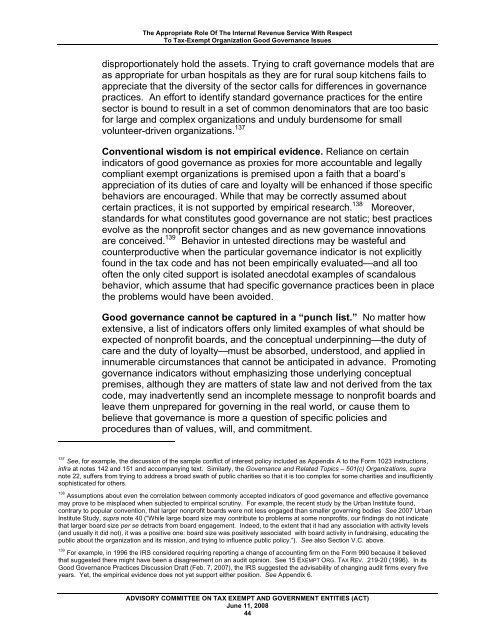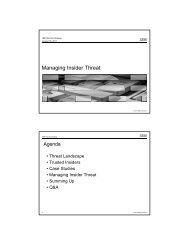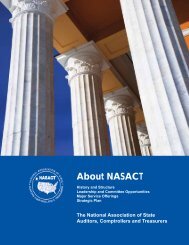Advisory Committee on Tax Exempt and Government Entities (ACT ...
Advisory Committee on Tax Exempt and Government Entities (ACT ...
Advisory Committee on Tax Exempt and Government Entities (ACT ...
You also want an ePaper? Increase the reach of your titles
YUMPU automatically turns print PDFs into web optimized ePapers that Google loves.
The Appropriate Role Of The Internal Revenue Service With Respect To <strong>Tax</strong>-<strong>Exempt</strong> Organizati<strong>on</strong> Good Governance Issuesdisproporti<strong>on</strong>ately hold the assets. Trying to craft governance models that areas appropriate for urban hospitals as they are for rural soup kitchens fails toappreciate that the diversity of the sector calls for differences in governancepractices. An effort to identify st<strong>and</strong>ard governance practices for the entiresector is bound to result in a set of comm<strong>on</strong> denominators that are too basicfor large <strong>and</strong> complex organizati<strong>on</strong>s <strong>and</strong> unduly burdensome for smallvolunteer-driven organizati<strong>on</strong>s. 137• C<strong>on</strong>venti<strong>on</strong>al wisdom is not empirical evidence. Reliance <strong>on</strong> certainindicators of good governance as proxies for more accountable <strong>and</strong> legallycompliant exempt organizati<strong>on</strong>s is premised up<strong>on</strong> a faith that a board’sappreciati<strong>on</strong> of its duties of care <strong>and</strong> loyalty will be enhanced if those specificbehaviors are encouraged. While that may be correctly assumed aboutcertain practices, it is not supported by empirical research. 138 Moreover,st<strong>and</strong>ards for what c<strong>on</strong>stitutes good governance are not static; best practicesevolve as the n<strong>on</strong>profit sector changes <strong>and</strong> as new governance innovati<strong>on</strong>sare c<strong>on</strong>ceived. 139 Behavior in untested directi<strong>on</strong>s may be wasteful <strong>and</strong>counterproductive when the particular governance indicator is not explicitlyfound in the tax code <strong>and</strong> has not been empirically evaluated—<strong>and</strong> all toooften the <strong>on</strong>ly cited support is isolated anecdotal examples of sc<strong>and</strong>alousbehavior, which assume that had specific governance practices been in placethe problems would have been avoided.• Good governance cannot be captured in a “punch list.” No matter howextensive, a list of indicators offers <strong>on</strong>ly limited examples of what should beexpected of n<strong>on</strong>profit boards, <strong>and</strong> the c<strong>on</strong>ceptual underpinning—the duty ofcare <strong>and</strong> the duty of loyalty—must be absorbed, understood, <strong>and</strong> applied ininnumerable circumstances that cannot be anticipated in advance. Promotinggovernance indicators without emphasizing those underlying c<strong>on</strong>ceptualpremises, although they are matters of state law <strong>and</strong> not derived from the taxcode, may inadvertently send an incomplete message to n<strong>on</strong>profit boards <strong>and</strong>leave them unprepared for governing in the real world, or cause them tobelieve that governance is more a questi<strong>on</strong> of specific policies <strong>and</strong>procedures than of values, will, <strong>and</strong> commitment.137See, for example, the discussi<strong>on</strong> of the sample c<strong>on</strong>flict of interest policy included as Appendix A to the Form 1023 instructi<strong>on</strong>s,infra at notes 142 <strong>and</strong> 151 <strong>and</strong> accompanying text. Similarly, the Governance <strong>and</strong> Related Topics – 501(c) Organizati<strong>on</strong>s, supranote 22, suffers from trying to address a broad swath of public charities so that it is too complex for some charities <strong>and</strong> insufficientlysophisticated for others.138Assumpti<strong>on</strong>s about even the correlati<strong>on</strong> between comm<strong>on</strong>ly accepted indicators of good governance <strong>and</strong> effective governancemay prove to be misplaced when subjected to empirical scrutiny. For example, the recent study by the Urban Institute found,c<strong>on</strong>trary to popular c<strong>on</strong>venti<strong>on</strong>, that larger n<strong>on</strong>profit boards were not less engaged than smaller governing bodies See 2007 UrbanInstitute Study, supra note 40 (“While large board size may c<strong>on</strong>tribute to problems at some n<strong>on</strong>profits, our findings do not indicatethat larger board size per se detracts from board engagement. Indeed, to the extent that it had any associati<strong>on</strong> with activity levels(<strong>and</strong> usually it did not), it was a positive <strong>on</strong>e: board size was positively associated with board activity in fundraising, educating thepublic about the organizati<strong>on</strong> <strong>and</strong> its missi<strong>on</strong>, <strong>and</strong> trying to influence public policy.”). See also Secti<strong>on</strong> V.C. above.139For example, in 1996 the IRS c<strong>on</strong>sidered requiring reporting a change of accounting firm <strong>on</strong> the Form 990 because it believedthat suggested there might have been a disagreement <strong>on</strong> an audit opini<strong>on</strong>. See 15 EXEMPT ORG. TAX REV. 219-20 (1996). In itsGood Governance Practices Discussi<strong>on</strong> Draft (Feb. 7, 2007), the IRS suggested the advisability of changing audit firms every fiveyears. Yet, the empirical evidence does not yet support either positi<strong>on</strong>. See Appendix 6.ADVISORY COMMITTEE ON TAX EXEMPT AND GOVERNMENT ENTITIES (<strong>ACT</strong>) June 11, 2008 44













